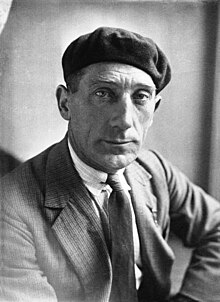Victor Fontan
Victor Fontan (born Pau, France, 18 June 1892, died Saint-Vincent 2 January 1982) was a French cyclist who led the 1929 Tour de France but dropped out after knocking at doors at night to ask for another bicycle. His plight led to a change of rules to prevent its happening again. He was also one of three riders who all wore the yellow jersey of leadership on the same day, the only time it has happened.
Victor Fontan was born in Pau but moved to the neighbouring commune of Nay, Pyrénées-Atlantiques when young. His father was a clog-maker. Fontan married a local girl, Jeanne Larquey, but couldn't go out with her without a chaperone, the mother of Marcel Triep-Capdeville, later mayor of Nay. The couple had a son, Francis, who became a heart surgeon in Bordeaux, and a daughter, Gaby, a teacher in Pau. Fontan spent his early career in local races near the Pyrenees He raced from 1910, became a professional in 1913, then fought in the first world war. He was shot twice in one leg. On demobilisation in 1920 he started racing again and became the best rider in the south-west. He was reluctant to race far from home, which made him unattractive to national sponsors.
Fontan rode the 1924 Tour de France as an individual entrant, but he did not finish. He was assumed to already be too old for such intense competition, plus being handicapped by being less known outside the south-west.
He rode the 1928 race for a local sponsor, the Elvish bicycle company. His team was so poor that he lost time looking after the others. He could not leave them to themselves because the seven flat stages were run as team time trials, the organiser, Henri Desgrange still trying to find a way to stop riders taking much of each day steadily and racing only as they neared the finish. The American historian Bill McGann wrote:
...
Wikipedia

